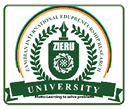ZIERU is driven by a mission to provide education that not only imparts knowledge but equips students with the practical skills necessary to create solutions for real-world challenges, particularly those outlined in the United Nations Sustainable Development Goals (SDGs).
ZIERU is not just an institution; it is a model university designed to reshape education in Africa and beyond. It is deeply rooted in a philosophy that recognizes the importance of interdisciplinary learning, innovation, and the commercialization of research. By embedding entrepreneurship and research competencies across all disciplines—whether in business, health, engineering, agriculture, or social sciences—ZIERU prepares its graduates to become thought leaders and innovators in their respective fields.
The Genesis of the ZIERU Model.
The ZIERU model was conceived by Dr. Norman Kachamba, a visionary academic and thought leader who has been at the forefront of re-educating Africa for the past two years. Dr. Kachamba’s agenda has been driven by the belief that Africa’s education systems need to be transformed to produce not only knowledgeable graduates but also entrepreneurial thinkers and problem-solvers. This vision was born out of his extensive research into the challenges facing African higher education, particularly the mismatch between traditional curricula and the skills required for Africa’s socio-economic development.
Dr. Kachamba’s goal was clear: to develop an educational institution that would redefine higher education by:
- Integrating entrepreneurship into every field of study, enabling students to turn academic knowledge into practical, scalable business ideas.
- Embedding research skills across disciplines, allowing students to engage in research that addresses societal needs and global challenges, particularly those aligned with the SDGs.
- Emphasizing real-world application, where learning goes beyond theory to include hands-on experiences, internships, research projects, and commercializable outcomes.
The ZIERU model is, a culmination of his two-year journey of rethinking education for the African continent. His vision aligns with the Fourth Industrial Revolution (IR 4.0), which requires a workforce equipped with digital, analytical, and entrepreneurial skills. The university serves as a beacon of this new educational paradigm, one where academic institution plays a central role in driving national development by producing job creators rather than job seekers.
